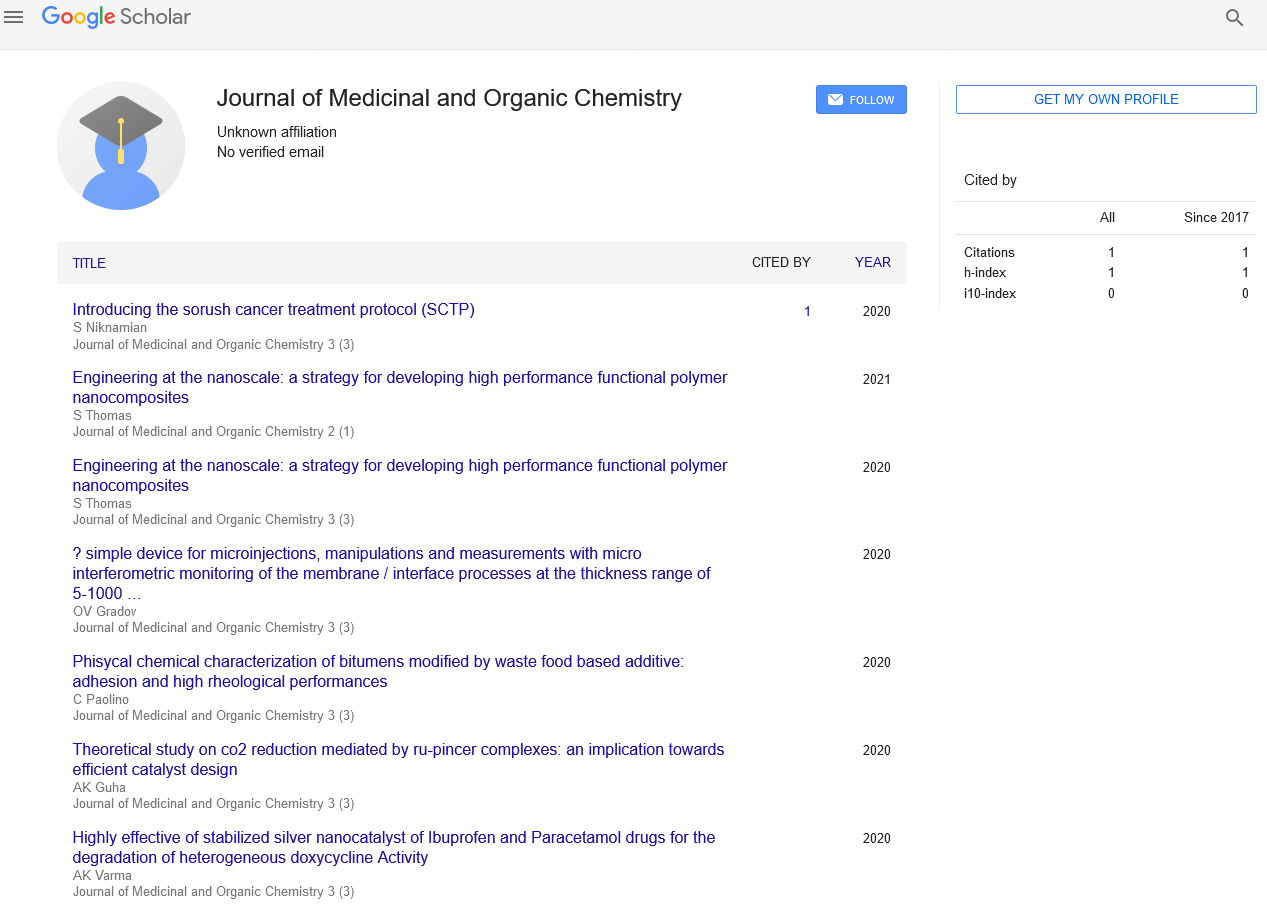Perspective - Journal of Medicinal and Organic Chemistry (2024) Volume 7, Issue 1
Unraveling the Threads of Disease: The Intricacies of Epidemiology
- Corresponding Author:
- Carlos Cruchaga
Department of Epidemiology,
Flamingo University,
New York,
USA
E-mail: wustl@cruchagac.edu
Received: 25-Jan-2024, Manuscript No. jmoc-24-126341; Editor assigned: 30-Jan-2024, PreQC No. jmoc-24-126341 (PQ); Reviewed: 13-Feb-2024, QC No. jmoc-24-126341; Revised: 22-Feb-2024, Manuscript No. jmoc-24-126341 (R); Published: 29-Feb-2024, DOI: 10.37532/jmoc.2024.7(1).169-170
Introduction
Epidemiology, often described as the cornerstone of public health, offers a lens through which to understand the patterns, determinants and distribution of disease within populations. From identifying risk factors for disease onset to evaluating the effectiveness of preventive interventions, epidemiology plays a vital role in safeguarding global health and informing evidence-based policies and practices. In this comprehensive exploration, we delve into the fundamental principles, methodological approaches and transformative impact of epidemiology on disease prevention, control and public health surveillance.
Description
Fundamental principles of epidemiology
At its core, epidemiology seeks to uncover the factors influencing the occurrence and spread of disease, including biological, environmental, social and behavioral determinants. By analyzing patterns of disease distribution, epidemiologists can identify high-risk populations, elucidate disease etiology and guide targeted interventions to mitigate disease burden. Key principles of epidemiology include the concepts of causality, association, population-based comparisons and the use of epidemiological measures such as incidence, prevalence and risk ratios to quantify disease occurrence and assess public health impact.
Descriptive epidemiology
Descriptive epidemiology provides a snapshot of disease occurrence within populations, documenting patterns of morbidity and mortality over time, by geographic location and among different demographic groups. Epidemiologists employ surveillance systems, registries and vital statistics data to track disease trends, identify emerging health threats and monitor the impact of public health interventions. By characterizing disease patterns and distribution, descriptive epidemiology informs priority setting, resource allocation and targeted interventions to address health disparities and improve population health outcomes.
Analytical epidemiology
Analytical epidemiology delves deeper into the causal mechanisms underlying disease occurrence, investigating the relationship between exposure to risk factors and the likelihood of disease development. Analytical studies, including cohort studies, case-control studies and randomized controlled trials, allow researchers to assess associations between exposures and outcomes, quantify risk estimates and infer causality. By elucidating the role of genetic, environmental and lifestyle factors in disease causation, analytical epidemiology informs strategies for disease prevention, risk reduction and health promotion.
Infectious disease epidemiology
Infectious disease epidemiology focuses on the transmission dynamics, natural history and control measures of communicable diseases within populations. Epidemiologists track outbreaks, investigate sources of infection and implement control measures such as vaccination, vector control and quarantine to limit disease spread. Mathematical modeling techniques, including compartmental models and transmission dynamics simulations, aid in predicting disease outbreaks, assessing intervention strategies and informing public health policies to mitigate infectious disease threats.
Chronic disease epidemiology
Chronic disease epidemiology examines the distribution, risk factors and long-term consequences of non-communicable diseases such as cardiovascular disease, cancer, diabetes and respiratory conditions. Epidemiological research identifies modifiable risk factors such as tobacco use, unhealthy diet, physical inactivity and environmental exposures that contribute to chronic disease development. By promoting primary prevention strategies, lifestyle modifications and early detection initiatives, chronic disease epidemiology aims to reduce disease burden and improve population health outcomes.
Global health epidemiology
Global health epidemiology addresses health disparities, infectious disease outbreaks and emerging public health challenges on a global scale. Epidemiologists collaborate across borders to track disease transmission, assess population health needs and implement interventions to strengthen health systems and promote health equity. Global health epidemiology encompasses initiatives such as disease surveillance networks, outbreak response teams and capacity-building efforts to enhance epidemiological expertise and infrastructure in resource-limited settings.
Environmental epidemiology
Environmental epidemiology investigates the impact of environmental exposures, including air pollution, water contamination, occupational hazards and climate change on human health outcomes. Epidemiological studies assess the association between environmental exposures and disease risks, quantify population-level health impacts and inform regulatory policies to protect public health. By identifying environmental risk factors and advocating for preventive measures, environmental epidemiology contributes to mitigating environmental health hazards and safeguarding environmental justice.
Future directions in epidemiology
The future of epidemiology is characterized by interdisciplinary collaborations, technological advancements and innovative methodologies aimed at addressing emerging public health challenges and improving health outcomes worldwide. Genomic epidemiology, precision medicine, digital health technologies and big data analytics offer new avenues for understanding disease etiology, predicting disease trends and tailoring interventions to individual and population needs. Moreover, efforts to strengthen global surveillance systems, enhance data sharing and promote health equity are essential for advancing the field of epidemiology and achieving the goals of public health in the 21st century.
Conclusion
Epidemiology serves as a cornerstone of public health, providing essential insights into the distribution, determinants and dynamics of disease within populations. By applying rigorous methodologies, analytical approaches and interdisciplinary perspectives, epidemiologists uncover the factors influencing disease occurrence, inform evidence-based interventions and guide policy decisions to improve population health outcomes. As we continue to unravel the threads of disease through epidemiological inquiry, let us harness the transformative power of epidemiology to address current and emerging public health challenges, promote health equity and build healthier, more resilient communities for generations to come.

